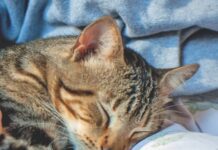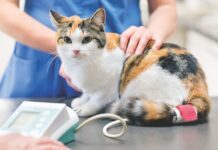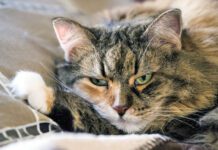It can be difficult to notice early heart disease in cats due to the fact that they are relatively sedentary and stoic in nature. You might notice your cat hiding or being less playful, but you could assume those changes are associated with age, especially since most cats that develop heart disease are diagnosed when they are middle-aged to older. Most cats that are initially presented for evaluation of their hearts are not showing signs of heart disease.
When symptoms do develop in cats with heart disease, they most commonly include rapid breathing (greater than 40 breaths/minute) and/or increased respiratory effort (working harder to breathe). If you feel her chest, you might be able to feel a rapid heart rate (greater than 240 beats/minute) or irregular beats. Many cats with heart problems also lose their appetite, are lethargic, and they may breathe with their mouths open. If you see any of these symptoms, contact a veterinarian promptly. There are heart medications that can help your cat live a longer life, especially when the disease is caught in its early stages.
“While we generally cannot ‘cure’ heart disease in cats, there are a number of therapeutic options that can improve the quality and duration of life in cats with heart disease,” says Dr. Bruce Kornreich, veterinary cardiologist and director of the Cornell Feline Health Center at the Cornell University College of Veterinary Medicine.
Cardiomyopathy
Cardiomyopathy is the medical word for a disease of the heart muscle that makes it more difficult for the heart to pump blood. Hypertrophic cardiomyopathy (HCM) is the most common type of heart disease in cats. HCM is characterized by a thickening of the muscle in the left ventricle, the heart’s main pump.
As many as 15% of cats are affected by HCM, and while it often doesn’t produce any symptoms in its early stages, HCM is most commonly a progressive disease that can lead to congestive heart failure, arterial thromboembolism (the formation of blood clots in the heart that are then ejected to the arteries, blocking blood supply to parts of the body), or even sudden death.
When the left ventricle is thickened, its ability to pump blood to the body decreases, resulting in less oxygen being transported throughout the body. The heart may beat rapidly to compensate, which can lead to irregular beats (arrhythmias). Eventually, blood may backup into the lungs due to the inefficient pumping action (left-sided congestive failure).
Hypertension and hyperthyroidism can also cause the heart muscle to thicken, and these must be ruled out prior to arriving at a diagnosis of HCM. If either (or both) of these conditions is identified, specific therapy to address them should be instituted.
Most cases of HCM will have a heart murmur, but not all cats with murmurs have heart disease. A large multi group epidemiologic study (known as the REVEAL study) involving over 1,000 cats with asymptomatic HCM showed that 82% of cats with HCM had murmurs. However, the study also noted that 46% of healthy cats did, too. Cats with HCM tended to have louder murmurs and were more likely have arrhythmias.
Diagnostics
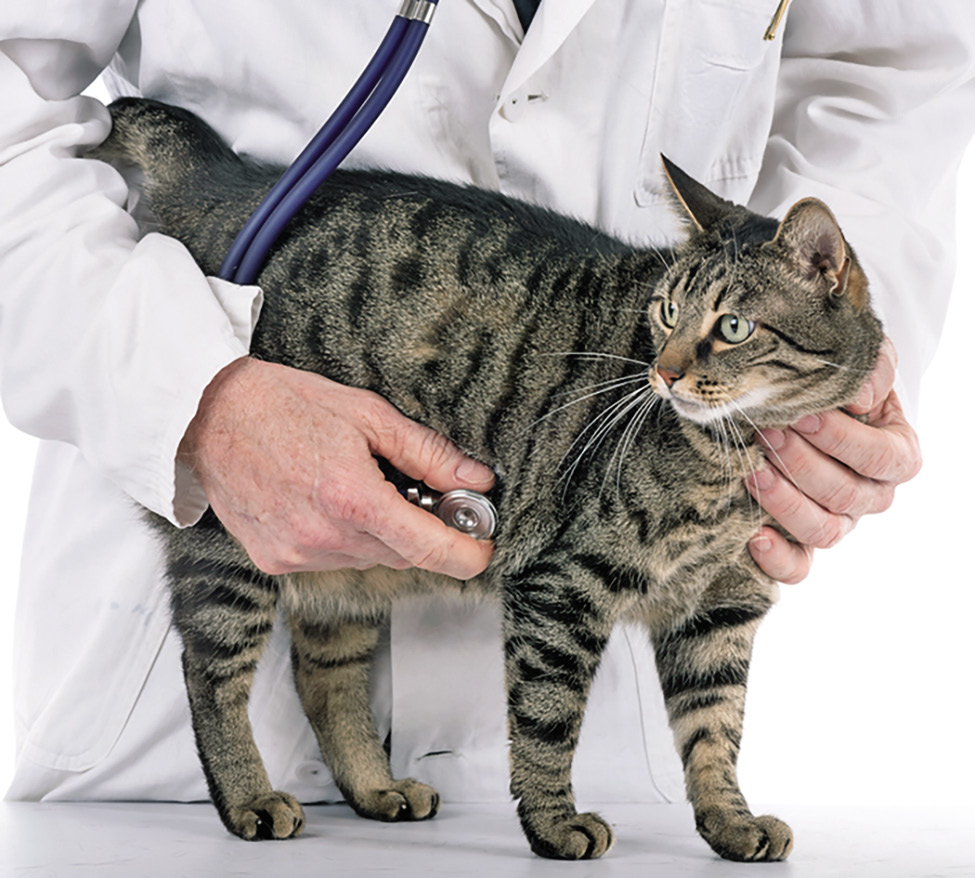
Your veterinarian can hear abnormalities in your cat’s heart with just a stethoscope, but to truly understand the cause, an echocardiogram is necessary.
If there are questions about your cat’s heart, your veterinarian may recommend an electrocardiogram, chest radiographs, and/or an echocardiogram, the latter of which is the gold standard test for cardiac problems. A blood test for N-terminal Pro B-type natriuretic peptide (NT-ProBNP), a hormone that is produced by the ventricular and atrial heart muscles when they are stretched, may be recommended. This is especially true if it is difficult to tell if your cat has problems breathing due to heart disease or some other problem (i.e., pneumonia). Provided that kidney function is normal, an elevated NT-ProBNP suggests that heart disease is present.
Owners of cats with heart disease but no clinical signs should monitor their cats’ respiratory rates when the cats are sleeping at least once weekly. The normal rate is less than 40 breaths per minute, and this should be tracked in a log. If the log shows a respiratory rate of greater than 40/minute and/or a 25% increase in rate over two consecutive measurements, consult your veterinarian.
Treatment
Treatment of feline HCM is aimed at trying to address/prevent congestion, support the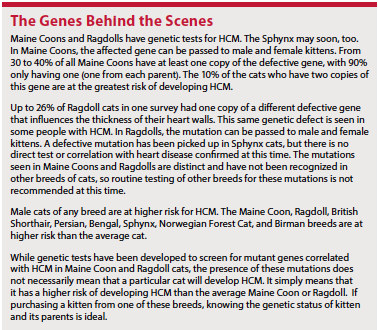 heart’s ability to pump blood efficiently, and to prevent the formation of blood clots in the heart.
heart’s ability to pump blood efficiently, and to prevent the formation of blood clots in the heart.
Diuretic drugs may be given to cats with congestive heart failure to induce urination and decrease blood volume. This can alleviate congestion in the lungs, making breathing more efficient. Antithrombotic (clot-preventing) drugs like clopidogrel and/or aspirin may help prevent the clots in the heart if the atria are dilated.
“The formation of clots in the hearts of cats with HCM can lead to thromboembolism, one of the most devastating sequelae of this common disease,” says Dr. Kornreich. This condition leads to the blockage of blood supply to various parts of the body, most commonly the hind limbs. Cats with HCM that experience thromboembolism can be quite painful and distressed, and this phenomenon significantly worsens the prognosis for cats with HCM.
In some cases, cats with HCM may also benefit from the use of drugs that increase the ability of the heart to generate pressure to move blood to the body (positive inotropes), although this remains a controversial issue.
Cats in acute heart failure may need to be hospitalized to receive diuretics intravenously and to be placed in an oxygen-enriched environment. In many cases, once they have made it through this initial crisis, they can be sent home on oral cardiac medications.
Bottom Line
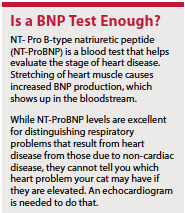 Early signs of heart disease can be easy to miss, especially since cats are so adept at hiding signs of discomfort. Rapid respiratory rate, increased respiratory effort, lethargy, decreased appetite, and hiding are ways your cat is telling you something is not right. Sudden onset of paralysis or difficulty walking in the hind limbs may suggest thromboembolism. When HCM is caught early, the disease progression can be slowed and the quality of life improved with medications, but it is not currently possible to “cure” the hearts of cats with HCM.ν
Early signs of heart disease can be easy to miss, especially since cats are so adept at hiding signs of discomfort. Rapid respiratory rate, increased respiratory effort, lethargy, decreased appetite, and hiding are ways your cat is telling you something is not right. Sudden onset of paralysis or difficulty walking in the hind limbs may suggest thromboembolism. When HCM is caught early, the disease progression can be slowed and the quality of life improved with medications, but it is not currently possible to “cure” the hearts of cats with HCM.ν


